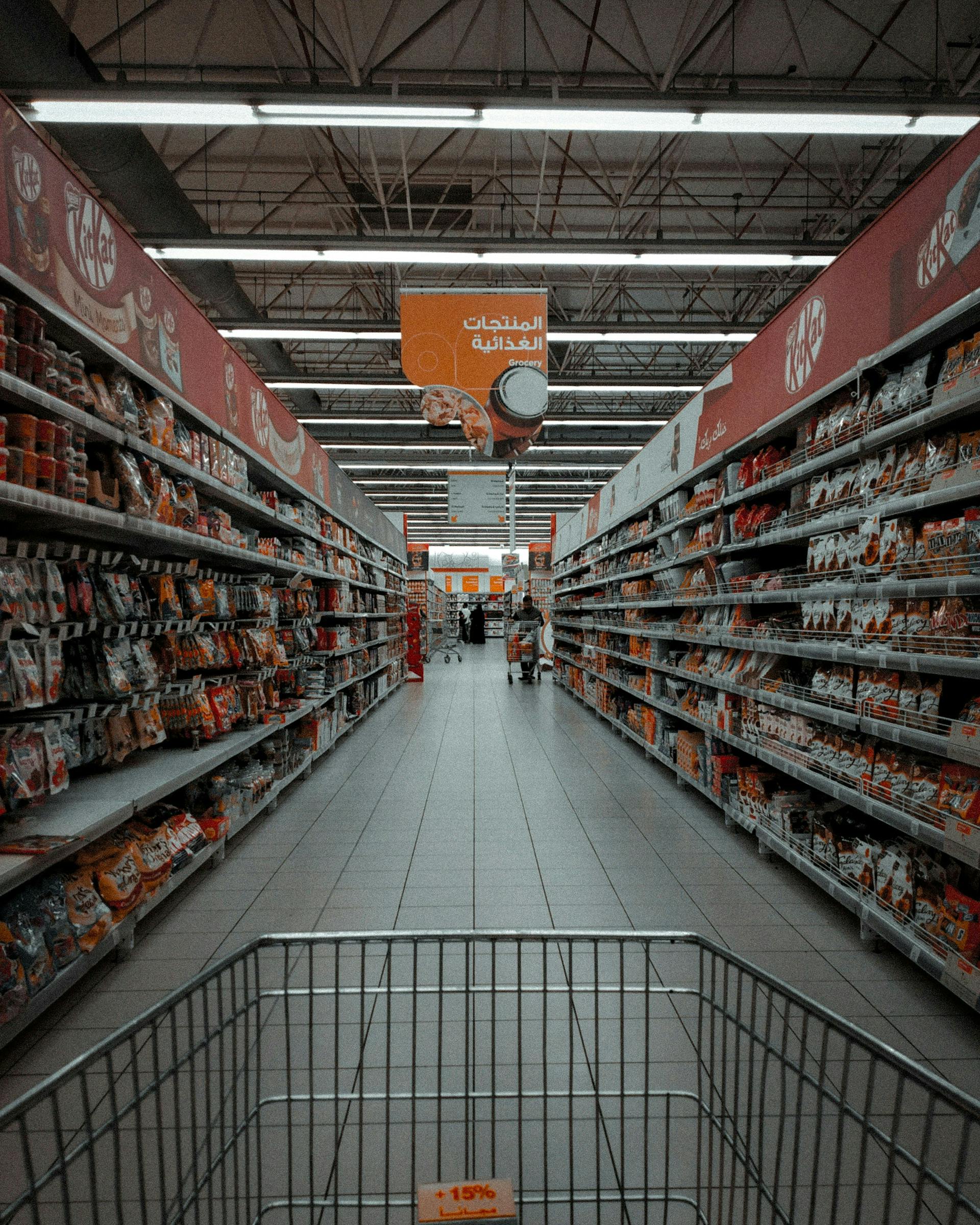The Consumer Upside Of An Economic Downturn
Dollarama stock is up. Google searches for “drive-in movies”, “cheap things to do for fun”, and “freezers” are at an all-time high. Individuals are buying more instant noodles. It’s clear that as the economy changes, consumer behavior is changing along with it. But these impacts aren’t as unpredictable as they might seem. With each recession, researchers aim to detail and explain how consumers react to the downturn. And based on these analyses, we can see a clearer picture of what is to come with future recessions.
Consumer responses to recessions can be counterintuitive but can lead to personal growth. Recently, researchers built a framework for consumer responses to financial hardship based on previous recession research. Among all findings, they noticed a pattern of response during an economic downturn. As consumers experience financial restriction, they tend to demonstrate the following steps: “React, Cope, and Adapt”.1
Recessions impact consumers in multiple ways, whether it be their financial limitations, employment opportunities, or through supply chain breakdowns. Among recession research, there are four main perspectives for how economic restriction can impact individuals:
- Resource scarcity (limited access to money)
- Choice restriction (limited options)
- Social comparison (an individual’s ability to elevate their social status)
- Environmental uncertainty (the predictability of the economic environment)1
Individuals respond differently to each perspective. But in many cases, this reactive behavior results in favorable growth in the long term. Recessions are in no way good, but they might strengthen our behavior in unique ways — like shaping how businesses approach consumerism once the recession is over.
References
- Hamilton, R. W., Mittal, C., Shah, A., Thompson, D. V., & Griskevicius, V. (2019). How Financial Constraints Influence Consumer Behavior: An Integrative Framework. Journal of Consumer Psychology, 29(2), 285–305. https://doi.org/10.1002/jcpy.1074
- Tomm, B. M., & Zhao, J. (2016). Scarcity captures attention and induces neglect: Eyetracking and behavioral evidence. In A. Papafragou, D. Grodner, D. Mirman & J. C. Trueswell (Eds.), Proceedings of the 38th Annual Conference of the Cognitive Science Society (pp. 1199–1204). Austin, TX: Cognitive Science Society.
- Mani, A., Mullainathan, S., Shafir, E., & Zhao, J. (2013). Poverty impedes cognitive function. Science, 341, 976–980. https://doi-org.ezproxy.lib.ucalgary.ca/10.1126/science.1238041
- Bakhitiari, K. (2020). How Will The Pandemic Change Consumer Behavior. Forbes. From https://www.forbes.com/sites/kianbakhtiari/2020/05/18/how-will-the-pandemic-change-consumer-behavior/#386ea78066f6
- Carmichael, K. (2020, May 22). As recession reshapes consumer and corporate behaviour, smart companies will seize chance to change | Financial Post. https://business.financialpost.com/news/economy/as-recession-reshapes-consumer-and-corporate-behaviour-smart-companies-will-seize-chance-to-change
- Changes in Consumer Behavior: Rising Retail Categories. (2020). Think with Google. Retrieved June 14, 2020, from https://www.thinkwithgoogle.com/feature/category-trends/us/month/en
- Chiang, C. (2020, May 22). China’s post-COVID consumer trends may offer preview of B.C.’s own future—Asia Pacific | Business in Vancouver. https://biv.com/article/2020/05/chinas-post-covid-consumer-trends-may-offer-preview-bcs-own-future
- Howland, D. (2020, June 10). Apparel margins take a hit as retailers face a new future | Retail Dive. RetailDive. https://www.retaildive.com/news/apparel-margins-take-a-hit-as-retailers-face-a-new-future/579542/
- Thomas, L. (2020, June 11). Lululemon sales fall 17% as retailer takes hit from stores being closed, shares drop. CNBC. https://www.cnbc.com/2020/06/11/lululemon-lulu-reports-fiscal-q1-2020-earnings.html
- US retail sales beat expectations in June. (2019, July 16). CNBC. https://www.cnbc.com/2019/07/16/retail-sales-june-2019.html
- Mehta, R., & Zhu, M. (2016). Creating when you have less: The impact of resource scarcity on product use creativity. Journal of Consumer Research, 42, 767–782. https://doi-org.ezproxy.lib.ucalgary.ca/10.1093/jcr/ucv051
- Rosa, J. A., Geiger-Oneto, S., & Fajardo, A. B. (2012). Hope and innovativeness: Transformative factors for subsistence consumer-merchants. In Transformative consumer research for personal and collective well-being (pp. 151–170). Routledge/Taylor & Francis Group.
- The impact of COVID-19 on investment management | Deloitte Insights. (2020). Retrieved June 14, 2020, from https://www2.deloitte.com/us/en/insights/economy/covid-19/investment-management-impact-of-covid-19.html
- Durante, K. M., Griskevicius, V., Redden, J. P., & White, A. E. (2015). Spending on daughters versus sons in economic recessions. Journal of Consumer Research, 42, 435–457. https://doi-org.ezproxy.lib.ucalgary.ca/10.1093/jcr/ucv023
- Landrum, S. (2016). Why Millennials Care About Social Impact Investing. Forbes. Retrieved June 17, 2020, from https://www.forbes.com/sites/sarahlandrum/2016/11/04/why-millennials-care-about-social-impact-investing/
About the Author
Kaylee Somerville
Kaylee is a research and teaching assistant at the University of Calgary in the areas of finance, entrepreneurship, and workplace harassment. Holding international experience in events, marketing, and consulting, Kaylee hopes to use behavioral research to help individuals at work. She is particularly interested in the topics of gender, leadership, and productivity. Kaylee completed her Bachelor of Commerce degree from the Haskayne School of Business at the University of Calgary.
About us
We are the leading applied research & innovation consultancy
Our insights are leveraged by the most ambitious organizations
“
I was blown away with their application and translation of behavioral science into practice. They took a very complex ecosystem and created a series of interventions using an innovative mix of the latest research and creative client co-creation. I was so impressed at the final product they created, which was hugely comprehensive despite the large scope of the client being of the world's most far-reaching and best known consumer brands. I'm excited to see what we can create together in the future.
Heather McKee
BEHAVIORAL SCIENTIST
GLOBAL COFFEEHOUSE CHAIN PROJECT
OUR CLIENT SUCCESS
$0M
Annual Revenue Increase
By launching a behavioral science practice at the core of the organization, we helped one of the largest insurers in North America realize $30M increase in annual revenue.
0%
Increase in Monthly Users
By redesigning North America's first national digital platform for mental health, we achieved a 52% lift in monthly users and an 83% improvement on clinical assessment.
0%
Reduction In Design Time
By designing a new process and getting buy-in from the C-Suite team, we helped one of the largest smartphone manufacturers in the world reduce software design time by 75%.
0%
Reduction in Client Drop-Off
By implementing targeted nudges based on proactive interventions, we reduced drop-off rates for 450,000 clients belonging to USA's oldest debt consolidation organizations by 46%



















